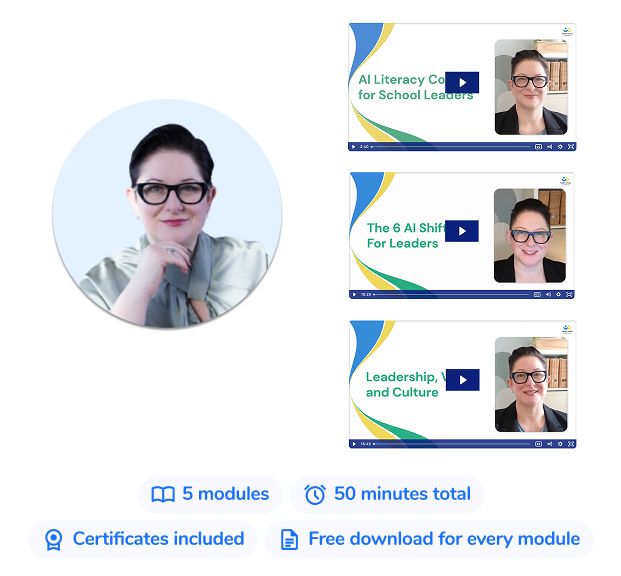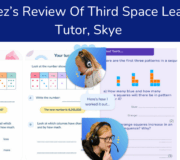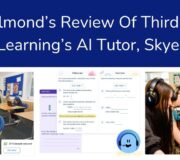KS2 Tutoring: An Essential Strategy For Primary School Teachers And Leaders
KS2 tutoring grew in popularity as an intervention strategy among primary schools with the introduction of the National Tutoring Programme (NTP) and has remained popular since the end of the NTP. This leaves school leaders with a crucial question: how can tutoring be effectively implemented to maximise its impact?
Identifying which students to target and which subject to focus on are important initial steps. But, there are other considerations to take into account to make sure your primary school tutoring programme is a success. You’ll need to think about how to access the most skilled tutors, whether you offer online tutoring or face-to-face tutoring, and choose between group and one-to-one.
And today, there’s even the option of AI tutoring to consider.
To support you in getting your school-based tuition up and running, this blog post will give you insight and tips. It will examine the benefits and limitations of different approaches, and provide suggestions for what schools can do to achieve the greatest impact from their tutoring services.
What is KS2 tutoring?
KS2 tutoring is any educational support given to primary school pupils in Key Stage 2, with the aim of helping them to improve academically. The focus of tuition for children of this age is predominantly on the core subjects of maths and English.
When many people think of tutoring, they think of private tuition undertaken by students outside of the school day. But recently, there has been an increasing trend for tuition to take place in school, during school hours.
The Primary School Guide to Maths Tutoring
Learn how to choose, plan and fund the right tutoring approach for your pupils for maximum impact.
Download Free Now!At KS2, many schools look specifically for SATs tutoring programmes, which can be beneficial in preparation for these exams. However, it is also beneficial to start tutoring earlier in pupil’s journey through primary school as you can close gaps as they appear and prevent them from growing – reducing the job for Year 6 teachers in the rush before SATs!
Demand for KS2 school-based tuition was already rising before the covid pandemic. Since 2020, the number of children with a maths tutor or English tutor has increased, even in secondary school, to help fill gaps in learning caused by school closures. Many children still require extra school intervention and support, with schools seeking ways to achieve this.
The introduction of the National Tutor Programme (NTP) and Pupil Premium, launched by the government in response to these issues has meant more schools are now able to access KS2 tutoring opportunities for their students. This programme was partly introduced since research clearly shows the positive impact high-quality tutoring has on accelerating learners’ progress and narrowing the attainment gap. In fact, the Education Endowment Foundation (EEF) identifies tuition as being one of the best intervention strategies in schools.
Third Space Learning was a tuition partner with the NTP since it first launched in 2020. Since then, thousands of schools have chosen Third Space Learning to deliver online one to one maths tuition through and after the NTP. Learn more about our KS2 tutoring programmes.
Choosing the right tuition
School-based tuition falls into main two categories:
- One-to-one tuition – a more traditional model, shown by the EEF to result in pupils making five months progress
- Small group tuition – shown to help pupils make up to four months progress.
Either one-to-one or group sessions can be carried out both in person at school, or online remotely.
When deciding which route to go down, school leaders need to think about the children in their own setting and have an awareness of the benefits and limitations of each. Here is a summary of the pros and cons of each:
One-to-One Tuition
Benefits
With one-to-one tutoring, students receive individual attention. The tutor is able to focus on the individual needs of the pupil and customise the learning appropriately. This means that specific areas can be addressed and targeted, which can help the student to gain confidence.
This form of tuition is useful for students who are easily distracted.
Limitations
The biggest limiting factor here is cost. The cost of one-to-one tuition is traditionally considerably higher since only one pupil is receiving tuition at one time. It also limits the total number of pupils who are able to benefit from this form of English and maths intervention.
By taking tuition online, schools choosing Third Space Learning benefit from a personalised, one to one AI maths tutor for roughly a fraction of the cost of traditional one to one. For one low cost annual fee, schools can provide unlimited AI maths tutoring sessions to unlimited pupils.
AI maths tutor Skye is trained by our qualified teachers and maths specialists to ensure high-quality tutoring that uses curriculum-aligned lessons.
Find out more about primary AI maths tutoring for Years 4-6.
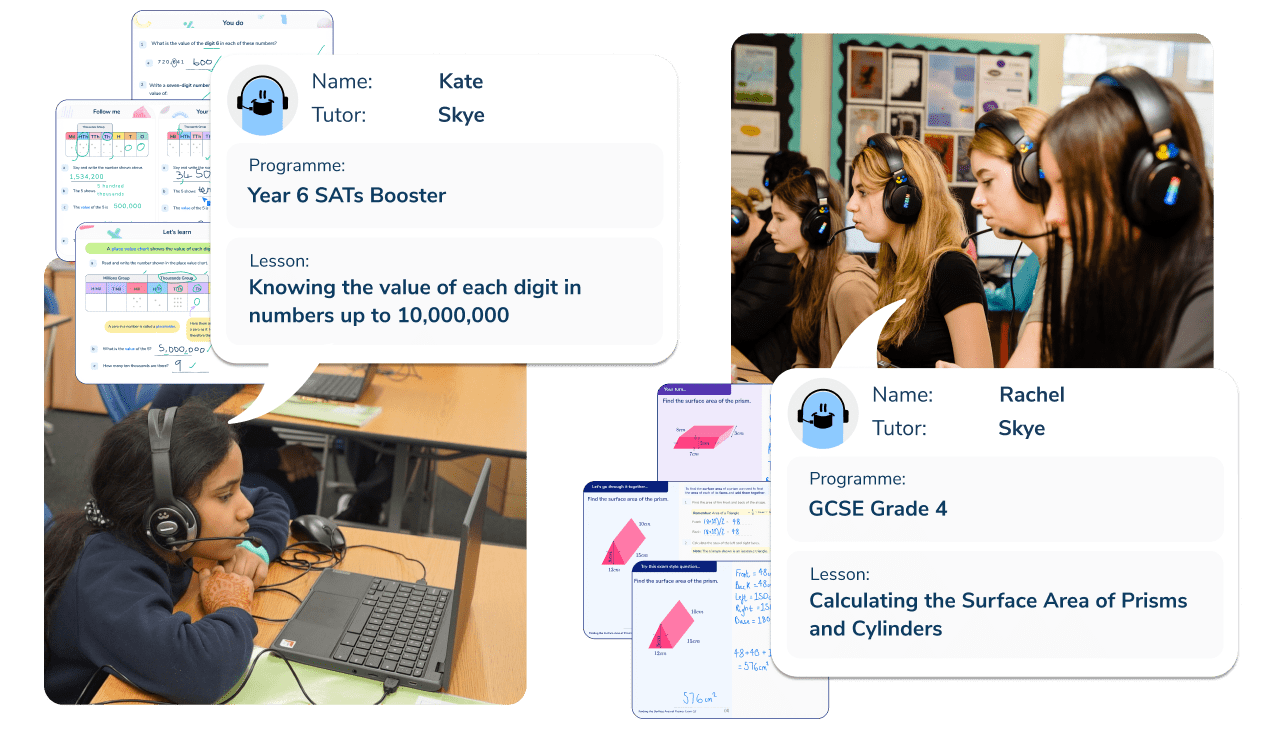
Meet Skye, the voice-based AI tutor making maths success possible for every student.
Built by teachers and maths experts, Skye uses the same pedagogy, curriculum and lesson structure as our traditional tutoring.
But, with more flexibility and a lower cost, schools can scale online maths tutoring to support every student who needs it.
Watch Skye in actionGroup Tuition
Benefits
In small groups, students are provided with the opportunity to learn from each other. They can discuss concepts, share ideas and learn from each other’s misconceptions. Pupils are also able to provide support for each other, and the less intense nature of group tuition, compared to one-to-one, is preferred by some students.
Group tutoring can also be cost-effective since the cost is divided between a number of students, rather than all being focused on one.
Limitations
With group tuition, there is less individual attention. The attention of the tutor is split between students, and focus can’t be as targeted as it can with one-to-one tuition. It’s, therefore, more difficult to manage distractions and keep all pupils on task, and tailor the work to individual needs.
Group sessions also provide more logistical challenges, such as finding space for a group of children. Any children involved will also miss a lesson to attend the group session, which needs to be considered too.
As a rule of thumb, the smaller the group, the better. The effect of group tuition is significantly weakened beyond groups of 3.
In-person Tuition
Benefits
Working with students in person allows for more direct communication and interaction. The tutor gains more awareness of how a pupil is progressing and any challenges they have.
Tutors are also able to provide more hands-on resources to support the children and are less reliant on technology, which can sometimes go wrong.
Limitations
The biggest limiting factors here are flexibility and cost. Finding a suitable tutor within a reasonable distance, who can offer the hours the school needs can be difficult. There are often higher costs involved with this too.
There is also likely to be more limited flexibility for a person tutoring in person, particularly if sessions need to be changed or rescheduled. This is much easier when a person is working remotely, than travelling to the school.
Online Tuition
Benefits
Online lessons offer more flexibility and convenience. The number of tutors available to a school also becomes considerably larger when looking at qualified tutors accessible online.
Online tutors are also able to work with those students not attending school and pupils can have access to online content in between sessions.
Limitations
There can be technical challenges with hardware, such as IT equipment, headsets and cameras. And lessons rely on a good quality internet connection to be successful.
At Third Space Learning, we support schools as much as possible with the initial set-up of online tutoring. Each school is assigned a dedicated, friendly account manager who is on hand to troubleshoot any issues.
There are also fewer opportunities for children to work with hands-on materials, which can affect the focus and concentration of some pupils. If you opt for online tutoring, make sure tutors make innovative use of technology or have a custom online classroom to work with. For example, the Third Space Learning online classroom was designed with maths in mind and has quick-click buttons to generate mathematical symbols.
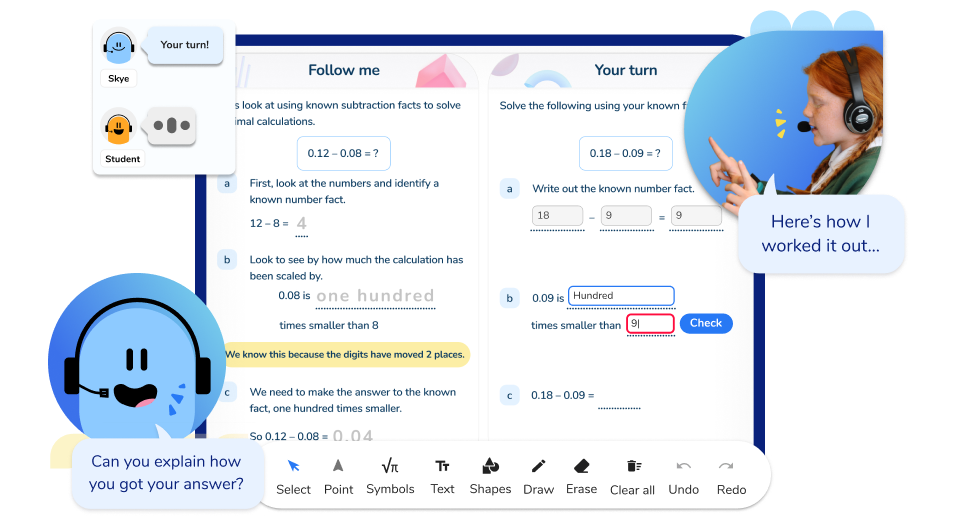
Why do schools opt for KS2 tutoring?
Schools may choose KS2 tutoring for a variety of reasons. These include:
- Supporting students who are struggling with their learning. Tutoring provides these children with extra support which they wouldn’t get in a whole class lesson. This helps to fill any gaps in their knowledge and improve their understanding of the subject.
- Addressing learning gaps caused by disruption to learning. This could either be due to school closures during the COVID pandemic or lost learning for other reasons.
- Exam preparation can be useful for preparing children for exams, such as the Year 6 SATS and entrance exams. Tutors can identify the areas students need extra support and provide targeted practice. This provides children with strategies for solving these questions but also helps to reduce anxiety.
- Build confidence and motivation with additional support and encouragement. Tutoring provides increased opportunities for receiving feedback and celebrating achievements, which can help children to feel much more positive about their learning.
What impact does KS2 tutoring have on pupils?
The impact KS2 tutoring has on pupils is overwhelmingly positive. Tutoring enables students’ needs to be addressed, ensuring knowledge gaps are filled and understanding of concepts is improved. This, in turn, leads to increased motivation, engagement and self-confidence. Improved academic performance is reported in most if not all cases.
The extensive evidence demonstrating the scale of pupils’ learning loss due to the Covid pandemic was discussed in the CfEy report: A Space for Maths. The Institute for Fiscal Studies has estimated a potential £350 billion loss of lifetime earnings for pupils, with disadvantaged pupils suffering more than their peers. The EEF also found socioeconomic attainment gaps have widened, particularly in maths.
The report also discussed the profound long-term impact on both individuals, society, and the link between maths attainment in KS2 and KS4. These clear links highlight further the importance of tackling learning loss and how tutoring can help schools to achieve this.
But to really achieve these results, schools need to be aware of the factors which can limit the impact of tutoring. We need to carefully consider the quality of the tutoring, including whether the tuition is delivered by a qualified teacher. We also need to monitor the commitment of the student and the consistency of the tutoring sessions.
Who should receive KS2 tutoring?
Tutoring can benefit various groups of students, including:
- Students who are struggling academically can benefit from tutoring support. These pupils can be helped through individual attention, to address any gaps.
- Disadvantaged students, particularly those who have suffered most since the covid pandemic.
- Students who are preparing for exams such as the Key Stage 2 SATs. In particular, borderline children could benefit from some extra support.
- Students with learning difficulties may benefit from adapted teaching methods that a tutor can provide.
How to maximise the impact of KS2 tutoring
Once a decision has been made to adopt a tutoring programme and what format the programme will take, you want to be sure you are getting the maximum impact out of it. We’re going to take a look at some of the things to think about to ensure your tutoring programme is a success.
- Identifying which pupils are most likely to benefit from the tuition: This is important. For example, pupils whose learning was particularly disrupted during the pandemic. Leaders shouldn’t automatically assume all pupils will benefit. It’s essential to think carefully about which children are most likely to engage and which children may not be suitable for tutoring and would benefit from alternative support.
- Use trained staff: The tutors you choose should have expertise in that subject and years of experience to deliver tutoring sessions to the highest standard. These may be qualified teachers already in the school or private tutors with a strong teaching background. They should also be DBS checked.
AI tutor, Skye, is trained by maths specialists and former teachers. Skye receives ongoing input and updated prompts that align with effective teaching strategies and are based on evidence from the 2 million+ sessions we’ve delivered to over 170,000 pupils.
- Make sure the tutoring experience is enjoyable: If students are to engage fully with the tutoring programme, then the sessions (whether online or in person) need to be enjoyable, encouraging active participation from all students.
- Prioritise tutor-student relationships: For learning to be effective, it is important to develop positive tutor-student relationships. Ideally, there should be consistency with the person delivering the tutoring programme, rather than a number of different people carrying out the delivery.
As all tutoring sessions are delivered by AI tutor, Skye, pupils work with the same tutor in every session. For pupils who struggle, feeling heard and supported is key. Students talk to their AI tutor and receive immediate feedback and scaffolding. Skye’s calm, non-judgmental tone and consistent encouragement help create a safe learning space where pupils try, make mistakes, and grow.
- Ensure the tutoring is relevant: Check the tutor is covering the relevant objectives from the National Curriculum and that it links to what the children are doing in the classroom. This gives the children the opportunity to apply the skills they have learnt once they are back in the classroom.
- Ensure the tutoring is targeted: Whether you choose one to one or small group tuition, ensure tutors use sensitive diagnostic assessment to identify pupils’ learning gaps and inform the sequence and structure of the tutoring programme. Generic programmes will not have the same effect as targeted interventions.
Every KS2 tutoring lesson begins with a short diagnostic assessment called the “Skill Check In” to identify the pupil’s baseline knowledge and adapt the lesson pathway in real-time.
If the pupil shows they’re not yet secure in their understanding, Skye will scaffold slides to teach the concept step-by-step. Skye models a similar example and works through questions together with the pupil before they move on to independent practice and challenge. If the pupil shows they’re ready, Skye will skip straight to the application and challenge section of the lesson.
Throughout, Skye uses formative assessment to identify misconceptions and adapt hints accordingly. Every lesson ends with a short summative assessment, the “Skill Check Out” to check the pupil’s understanding and track progress over time.
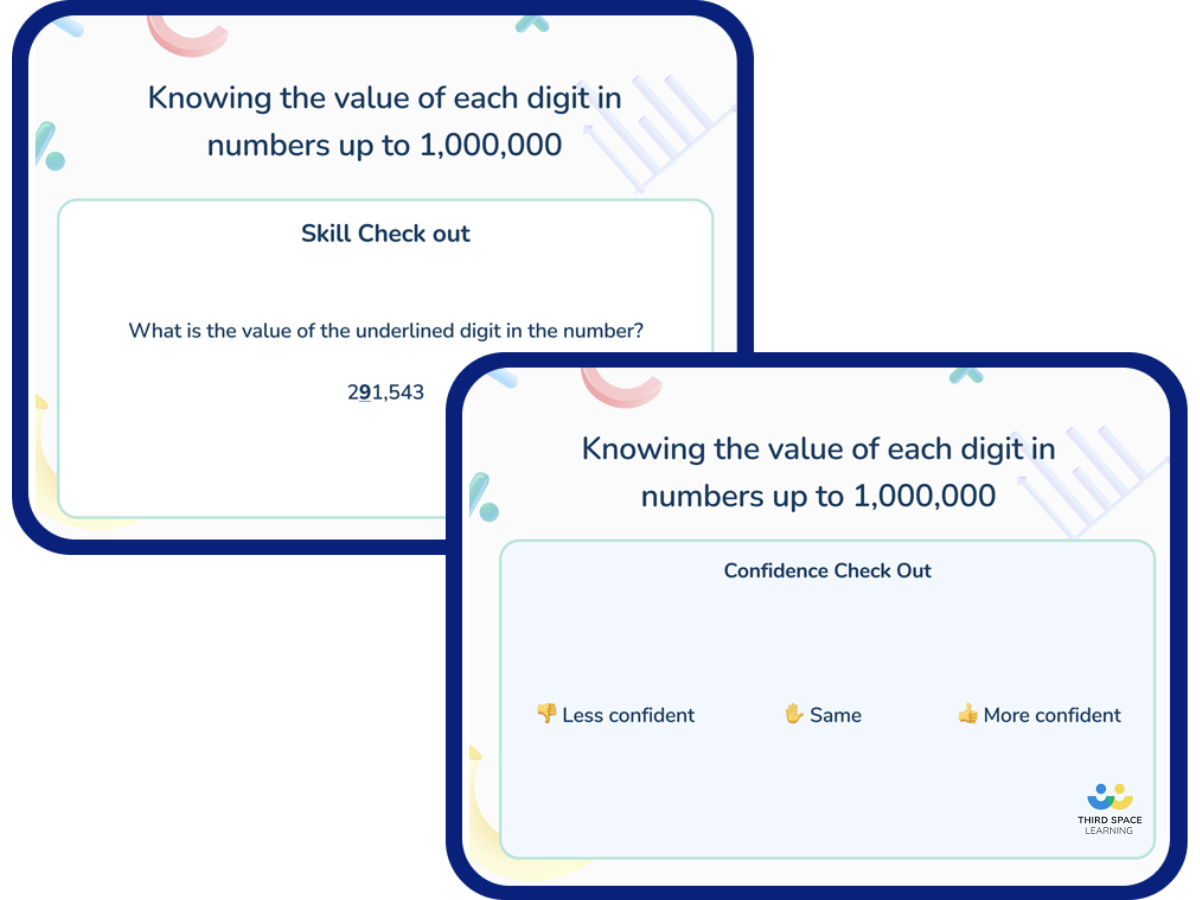
- Ensure regular feedback is received: Check that the tutor is feeding back regularly, not only to the class teacher, but also to the pupils themselves, so they are aware of how they are progressing and any areas they need to improve on.
- Monitor progress: Review students’ progress on a regular basis, to ensure the impact of the programme is being measured.
At Third Space Learning, teachers have on-demand access to post-session reports detailing pupils’ progress across each lesson and KS2 tutoring programme.

Read more about tutoring: Best online tutoring websites
The best age to start tutoring depends on the individual needs and circumstances of each student. Tutoring can benefit pupils of all ages. In Key Stage 1 tutoring helps to build a strong foundation in the core subjects, which is carried through all age groups, from Key Stage 2, Key Stage 3, GCSEs, to A Levels.
A: You should tutor a child for short periods of time. As a guide, a maximum of one hour at a time, although younger children may benefit from shorter, half-hour-long sessions. Evidence shows that pupils benefit the most when tuition is high-intensity and frequent over a short period of time.
The best first tutoring sessions will involve building the initial rapport with the students and establishing the students’ strengths and weaknesses. In this first lesson, children should be told how the sessions will look, what will be expected of them and some of the key things you’ll be hoping they achieve.
Pupils should meet with their tutor at least once per week, with more frequent sessions if time and budget allow for this.
DO YOU HAVE STUDENTS WHO NEED MORE SUPPORT IN MATHS?
Skye – our AI maths tutor built by teachers – gives students personalised one-to-one lessons that address learning gaps and build confidence.
Since 2013 we’ve taught over 2 million hours of maths lessons to more than 170,000 students to help them become fluent, able mathematicians.
Explore our AI maths tutoring or find out about primary school tuition for your school.
